LG announced last month that it would stop manufacturing solar panels by the end of Q2 this year and shift its company focus to energy products like its popular LG RESU energy storage system. LG’s 160 employees and 60 contract workers at its 550-MW solar panel assembly facility in Huntsville, Alabama, will be assisted with finding work within its other business lines.
The Alabama plant began manufacturing panels in 2019 and likely never reached its full capacity. The COVID-19 pandemic limited production in 2020, and supply chain issues further weakened output in 2021. LG cited increased material and logistics costs, as well as severe supply constraints, as the main reasons behind the decision to stop solar panel manufacturing.
As a large panel supplier to the U.S. residential and small commercial markets, it’s not surprising that many installers and customers have questions about their completed and contracted projects. Solar Power World spoke with David Chang, LG Electronics USA’s head of solar panel sales, to find some answers.
SPW: When should solar installers stop quoting LG solar panels? At what point does the LG module supply cease?
LG: We’re advising installers to only quote LG panels if they have access to inventory.
Production at our Huntsville, Alabama, facility will continue into the second quarter and, subject to supply, we’ll continue production to fulfill orders through May. After that, we expect there will be enough inventory in the distribution channel to fulfill installers’ sold jobs well into the third quarter.
Throughout this time, we’re working with our distributor and installer partners to minimize disruption as much as possible.
What guidance can you provide your dedicated LG installers when searching for a new solar panel brand?
While I can’t recommend another brand, I urge our distributor and installer partners to consider the factors LG values and delivers with each of our energy products and services. These include: Strong research and development, high efficiency, aesthetics, a warranty the company will stand behind, supply chain vetting and quality assurance.
For future warranty claims that may need replacements, is LG keeping modules on hand?
LG will keep replacement modules on hand for a number of years. If replacements or repairs aren’t available, LG Electronics will provide product support pursuant to the limited warranty via pro-rated refund. LG will continue to honor the limited warranty for each product, and we’ll support customers for years to come.
Is there any potential to LG restarting panel production if solar manufacturing legislation is passed?
LG’s decision to exit the solar panel business and focus on other energy-related businesses was based on a thorough review of ongoing supply chain issues and rising material and logistical costs. Regardless of what happens on the policy front, this decision isn’t subject to change.
Could a different company take over the LG solar panel facility in Huntsville?
There’s no scenario where a different company could take over the Huntsville facility. Solar panel assembly has been located in one of the four buildings on our Huntsville campus. That building will be repurposed to support other growing LG businesses.
Solar panel manufacturers supplying the U.S. market react to LG’s exit and provide guidance on how to access their products
- Martin Pochtaruk, president, Heliene
Residential installers impacted by LG’s departure will benefit from seeking other North American suppliers. Having access to fast customer service in your time zone with the option for in-person interaction provides enormous value. Heliene offers three types of modules for the residential solar market, ranging from high-efficiency monocrystalline PERC cells to advanced heterojunction cell technology. All are manufactured in the U.S. and Canada, and meet requirements for the Buy American and the American Recovery and Reinvestment Acts.
Anyone requiring immediate supply can contact Heliene’s regional sales managers, who will look after each request expeditiously and with care. Our regional sales managers’ contact information can be found here.
- Mukesh Sethi, director of solar and energy storage, Panasonic Eco Systems North America
Panasonic remains committed to the solar market and will continue to offer homeowners high-quality solar and battery storage solutions through our network of trusted installers. With the experience, size, and scale to anticipate the needs of customers and installers, Panasonic combines the best in future technology and energy innovations with the stability to withstand changing market conditions long-term. This means we are there for both homeowners and installers when they need us.
More information on Panasonic’s Total Home Energy Solutions, such as the popular EverVolt 2.0 battery storage system and EverVolt modules, can be found here. Installers who are interested in adding Panasonic to their portfolio and becoming a Panasonic Authorized Installer can find more information about the benefits and how to apply here.
- Tom Thompson, VP of sales, Solaria
Solaria PowerXT panels are sought-after by discerning homeowners and solar installers for their high quality and sleek appearance; they’re reliable as they are attractive and efficient. Solaria PowerXT solar panels are designed and engineered using proprietary technology and assembly techniques that ensure outstanding aesthetics and greater power production. Optimized for high energy yield, Solaria PowerXT solar panels provide excellent value in clean electricity generation, especially on space-constrained roofs. The Solaria PowerXT 400 Series Pure Black technology ensures deployment of an attractive rooftop solar system – backed by a 30-year warranty on parts, power and labor.
Solaria Corporation, headquartered in California’s Silicon Valley, has a 20-year history in solar. Solaria panels are available through leading solar and electrical distributors throughout North America. Find more information here.
- Scott Moskowitz, Director of Strategy and Public Affairs, Q CELLS America
This industry needs more investment not less and so we were disappointed to hear that a high-quality competitor was exiting the market. We understand the difficulty that this will cause LG customers and are available to support them the best we can. Our hope is that more U.S. manufacturing can alleviate our industry’s supply chain challenges. Find more information on becoming a partner of Q CELLS here.



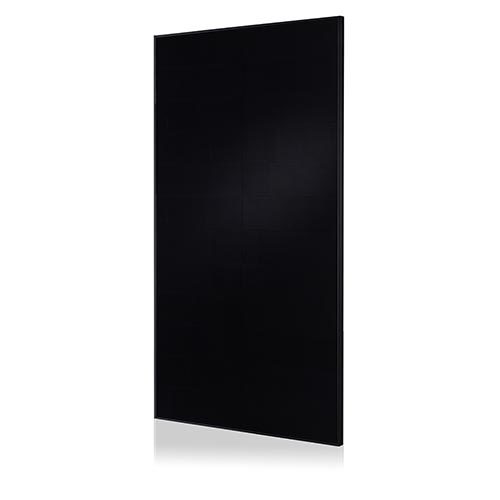

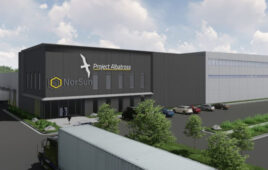
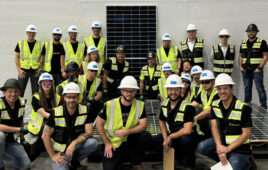
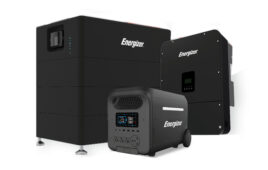
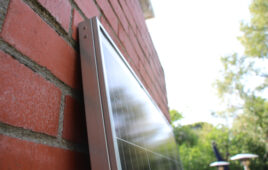
Can we please bring more emphasis to the destruction that Chinese manufacturers are bringing to the PV solar industry? Poor quality panels at discount prices from shady companies are destroying market share for well engineered products like LG Solar.
According to Finlay Colville, Head of Market Research at Solar Media, who addressed the audience at the Solar Finance and Investment Europe event in London this week, global demand for solar modules is roughly 25-30% higher than supply. Today, we chatted with an EnergyBin member, ATEN Solar, who specializes in surplus liquidations. He advises (as do we) installers to access the secondary solar market as an alternative sourcing solution. For example, on the EnergyBin exchange platform, installers can send RFQs to multiple wholesale suppliers as well as check product availability for Tier 1 brands. As our member pointed out, supply is constantly changing as projects get downsized or cancelled, as companies go out of business, or when property changes ownership, and when companies have unwanted, new, manufacturer-sealed excess material they seek to resell. Keeping tabs on both the primary and secondary markets is an installer’s best practice for sourcing ready-to-ship, affordable modules.
How about SunPower? LG and Panasonic both failed in trying yo displace SunPower in the high efficiency premium space.
SunPower has a long history of providing the highest quality products supported by the industry’s best warranty.
so what? those panels aren’t available to anyone but SunPower direct clientele, which are subject to the complete system tyranny!
Not 100% true. Since they spun off Maxeon they are subject to triggers that require SunPower and its Dealer network to either sell their agreed upon supply or SunPower can sell through other channels.
“LG cited increased material and logistics costs, as well as severe supply constraints, as the main reasons behind the decision to stop solar panel manufacturing.”
Therein lies a great deal of the problem up front. LG is bowing out of the U.S. manufacturing and Heleine is starting up manufacturing in the U.S., if Heleine doesn’t have a well-formed local silicon and foundry supply chain in place, they may not last long when put up against Chinese solar PV panel manufacturers that have their own supply chain and can manufacture panels cheaper than those made in the USA. I’m not seeing security in any of these startups in the U.S., unless they use solar PV, wind generation and smart energy storage to zero out their electricity costs to make solar PV panels.